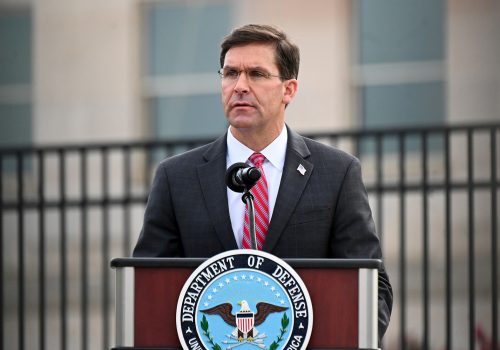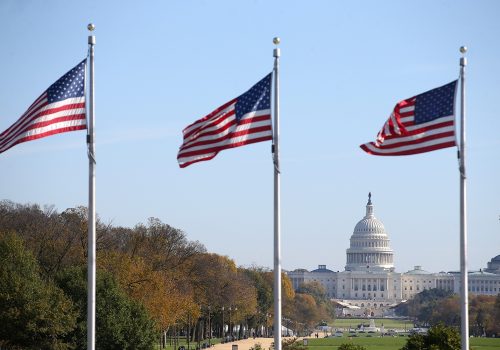FAST THINKING: Trump’s plan to bring US troops home by Inauguration Day
JUST IN
First he shook up the leadership at the Pentagon. Now, as his new acting defense secretary announced on Tuesday, Donald Trump is planning to withdraw significant numbers of US troops from Afghanistan and Iraq. How should we weigh the noble cause of ending wars against the president’s rush to do so as his term comes to an end? And how will these moves affect the Biden administration’s options when it takes office in January?
TODAY’S EXPERT REACTION COURTESY OF
- Barry Pavel: Former US national-security official and director of the Atlantic Council’s Scowcroft Center for Strategy and Security
- Will Wechsler: Former deputy assistant secretary of defense and director of the Atlantic Council’s Middle East programs
- James Cunningham: Former US ambassador to Afghanistan and Atlantic Council nonresident senior fellow
- Kirsten Fontenrose: Former national-security official in the Trump administration and director of the Scowcroft Middle East Security Initiative
- Emma Ashford: Grand strategist and Atlantic Council resident senior fellow in the Scowcroft Center’s New American Engagement Initiative
Isn’t bringing home troops a good thing?
- The largest cuts will come in Afghanistan, where more than 4,500 US troops will be rolled back to 2,500. The numbers in Iraq, meanwhile, will be reduced from 3,000 to 2,500. (The New York Times reported that nearly all of the 700-plus US troops in Somalia could be withdrawn too.) Barry asks a key question in evaluating these moves: Does the reality on the ground justify them? The timing doesn’t give him confidence—in fact, he says, it tells “you all you need to know about their justification: This is about politics, and the decisions do not appear to be informed by the professional military advice of the nation’s most senior and experienced military leaders.”
- That matters when local US allies are still fighting their adversaries, says Barry, who was a senior director for defense policy and strategy on the Bush and Obama administrations’ National Security Councils and a senior official in the Defense Department: “As we said when I served in the Pentagon, ‘the enemy gets a vote,’ and if the US withdraws forces precipitously, before conditions warrant, then our national security could suffer later.”
Subscribe to Fast Thinking email alerts
Sign up to receive rapid insight in your inbox from Atlantic Council experts on global events as they unfold.

How will the drawdowns affect US counterterrorism efforts?
- In each of the countries in question, combating terrorist groups such as ISIS and al-Qaeda is a critical part of the US mission. And Barry cautions against getting too distracted by the numbers. “Arbitrary numbers of US forces in various combat zones around the world don’t matter,” he tells us. “It’s the capabilities that they are bringing to bear.”
- Will, who was the Pentagon’s deputy assistant secretary for special operations and combating terrorism during the Obama administration, has more on the implications. He starts with important context: The primary focus for US forces in these countries is helping their local allies do the counterterrorism work themselves and prevent the emergence of terrorist sanctuaries. “So our strategy is to provide the necessary equipment, training, advice, assistance, and accompaniment” to local forces, Will says. “This counterterrorism mission doesn’t require an especially large number of US forces, but it certainly does require a consistency in the US approach. When working indirectly, the center of gravity for the US mission is the trust that our partner forces have in our commitment. Unfortunately, President Trump seems intent on breaking that trust.”
- Will’s concerned that the Trump administration is poised to repeat the mistakes of past US administrations by abandoning its local allies before they’re ready. “But it would be several orders of magnitude more irresponsible for President Trump to make this mistake in the midst of a presidential transition,” he adds. “President Biden will have to confront a region that Trump risks setting ablaze as he exits.”
The view on Afghanistan and Iraq
- Last week, six former US ambassadors published an open letter on the Atlantic Council’s website warning that a US drawdown in Afghanistan would undermine its ongoing peace negotiations with the Taliban while also imperiling Afghans who have worked alongside the US military and government. James, one of the authors of the letter and America’s top diplomat in the country from 2012-2014, notes that US troop levels there are already at their lowest levels since the early days of the conflict. Their presence, he tells us, “supports the Afghan security forces, the presence of our coalition partners, the difficult prospects for peace, and the still-necessary counterterrorism mission,” and he sees no good rationale for further withdrawals in the last weeks of the Trump administration.
- But in Iraq, Kirsten tells us that the US will retain enough capacity to continue with key aspects of its mission, including counterterrorism operations alongside elite Iraqi forces. She sees the drawdown as part of a US plan supported by Iraqi lawmakers to hand more responsibility to NATO. “Those drawn down will be trainers, advisors, and fighters who carry out the advise/assist/accompany work with Iraqi forces, a role the US has been in discussions with NATO about transitioning to their plate for almost a year now,” she says. “There should be no long-term impact on US national security from a drawdown of this size and nature, and no detrimental impact on building the capacity of Iraq’s forces if NATO’s mission in Iraq is willing (though not happily) and able (though not easily) to support a transition.”
A look at the politics—for Biden and Trump
- Emma sees the moves as “a partial fulfillment” of Trump’s campaign promises to end these wars. “But there are a lot of caveats,” she adds, referencing reports that Trump has also considered launching airstrikes against Iranian nuclear facilities in his final days in office. “If he withdraws some of the troops, but then turns around and strikes Iran, I would consider his legacy to be a continuation of America’s wars in the Middle East. And if he was serious about drawing down troops in Afghanistan or elsewhere, why wait until the end of his fourth year as president? It was clearly never a priority for him.” She adds that if Trump ends up running again in 2024, the drawdowns could factor into his campaign.
- There might be an unintended consequence to such political calculations, though. If Trump owns the inevitably messy end to these messy wars—especially in Afghanistan—it could benefit Biden. “For some years now, it’s been clear that it’s politically difficult to withdraw from Afghanistan, even if there is no good rationale to continue keeping troops there and no likelihood of success,” Emma says. “Biden is a more conventional politician, and would likely find it hard to follow through on the withdrawal. Trump could be doing him—and us all—a favor if he finally bit the bullet on an Afghanistan withdrawal.”
Further reading
Mon, Nov 9, 2020
FAST THINKING: Trump fires his defense secretary
Fast Thinking By
Two days after losing his bid for re-election, President Trump has removed Mark Esper, whose run as defense secretary was marked in its final stages by his defiance of Trump—on the idea of sending US troops to quell protests against police brutality and even on the question of wearing masks during the pandemic. How will his departure contribute to the post-election tumult? And is his successor likely to push back against the president?
Fri, Nov 6, 2020
America’s commitment to democracy must prevail at home and abroad
Elections 2020 By Daniel Fried
To pass the existential test now before us, we Americans must not only hold fast to our best values at home, but also uphold our commitment to reflecting those values as we look abroad.
Thu, Nov 5, 2020
FAST THINKING: The US election’s implications for allies and adversaries
Fast Thinking By
We don’t yet know the winner of the US presidential race—and, with the count so close and the prospect of contested results, we might not for some time, but the world is already drawing lessons from the outcome. So what are the likely takeaways in foreign capitals right now?
Image: REUTERS/Omar Sobhani/File Photo


